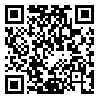Volume 10, Issue 1 (2019)
LRR 2019, 10(1): 149-169 |
Back to browse issues page
Download citation:
BibTeX | RIS | EndNote | Medlars | ProCite | Reference Manager | RefWorks
Send citation to:



BibTeX | RIS | EndNote | Medlars | ProCite | Reference Manager | RefWorks
Send citation to:
Ghaemi M, Sojoodi F. Linguistic Relativity & Discourse in Autobiography from the Viewpoint of Postmodernism. LRR 2019; 10 (1) :149-169
URL: http://lrr.modares.ac.ir/article-14-8966-en.html
URL: http://lrr.modares.ac.ir/article-14-8966-en.html
1- PhD in Art Research – Azad University – Science and Research Branch-Tehran-Iran
2- Associate Professor of Dramatic Art – Tehran University- Iran.
2- Associate Professor of Dramatic Art – Tehran University- Iran.
Abstract: (10153 Views)
When a text is comprehended in a familiar context and enjoys a coherent whole, it is called a discourse. Reading a discourse is owed to linguistic knowledge and non-linguistic cognition. As a narrative, an autobiography has its textual world. Its reality is a result of the method used for linguistic coding. Through the linguistic relativity on the part of the author, the self and the world are actively constructed. Through an analysis of linguistic domain in autobiography, for denotative meaning and connotative meanings, the author’s worldview is known. The subject in autobiography is moving from one experience to another. It is placed on a continuum of language, adopting multiple positions arisen from connotative utterances. Performance of this self has become a postmodern norm. We should ask about the relation between language and reality in autobiography, and about aspects of cultural identity of the self-represented. This article attempts to say that in our reading of a postmodern subject in the center of autobiography, in view of language as a medium for expression, and meta-language as a language to explain the language used to represent the self, how the multiple “self” & “others” arisen from such texts could be realized in language and participate in various discourses.
| Rights and permissions | |
 |
This work is licensed under a Creative Commons Attribution-NonCommercial 4.0 International License. |







